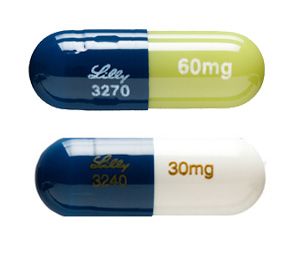Top Class Actions’s website and social media posts use affiliate links. If you make a purchase using such links, we may receive a commission, but it will not result in any additional charges to you. Please review our Affiliate Link Disclosure for more information.
A recent Cymbalta class action lawsuit claims that Eli Lilly has failed to disclose material facts to consumers and healthcare professionals about the frequency and severity of symptoms associated with stopping Cymbalta, a condition known as Cymbalta withdrawal or Cymbalta discontinuation syndrome.
According to the Cymbalta class action lawsuit, the warning label displayed on Cymbalta misleads consumers into believing that Cymbalta withdrawal is rare or uncommon by stating that withdrawal symptoms occur at a rate greater than or equal to 1 or 2 percent.
The Cymbalta withdrawal class action lawsuit alleges Eli Lilly was responsible for unfair and unlawful marketing of Cymbalta and caused the plaintiffs to purchase and use Cymbalta.
The Cymbalta class action lawsuit further alleges that Eli Lilly purposely concealed studies that indicated the frequency and severity of Cymbalta discontinuation syndrome. Cymbalta withdrawal lawyers claim that if Eli Lilly had been truthful in its representations regarding Cymbalta, the plaintiffs would not have purchased the drug.
What is Cymbalta?
Cymbalta is used to treat major depressive disorder (MMD). It is a serotonin norepinephrine reuptake inhibitor (SNRI), which in addition to supposedly increasing the amount of serotonin in the brain, also increases the amount of norepinephrine (a neurotransmitter and hormone associated with cardiovascular regulation).
Dangerous Cymbalta Withdrawal Side Effects
Cymbalta can create a physical dependence. Cymbalta withdrawal is a frequent and, at times, painful condition. Cymbalta patients are faced with severe physiological and psychological symptoms when they attempt to stop taking the antidepressant, including:
- dizziness
- nausea
- headache
- fatigue
- paresthesia (tingling, tickling, prickling, pricking, or burning sensation of a person’s skin)
- vomiting
- irritability
- nightmares
- insomnia
- diarrhea
- anxiety
- hyperhidrosis (Excessive sweating)
- vertigo
Allegedly, once Cymbalta users try to stop, the symptoms can be severe enough to force them to start taking Cymbalta again simply to combat the withdrawal symptoms. In other words, users develop a physical dependence on Cymbalta.
To beat the physical dependence on Cymbalta, users are forced to endure a protracted period of withdrawal — slowly reducing the ingestion of Cymbalta over several months until it is fully out of the body. During this period, users still experience substantial withdrawal symptoms, which can even continue for months after fully stopping the drug.
Cymbalta Warning Label Misleads Consumers
Since being approval by the U.S. Food and Drug Administration (FDA) in 2004, Eli Lilly has aggressively marketed Cymbalta to the public and the medical community nationwide, spending millions each year on advertising and marketing. In fact, Cymbalta sales have generated billions each year, including approximately $3.1 billion in 2009, $3.5 billion in 2010, and $4.16 billion in 2011.
Since 2004, with minor variations, the warning label on Cymbalta has misleadingly stated that the Cymbalta withdrawal symptoms occur at a rate greater than or equal to 1 percent or 2 percent. In truth, studies funded, designed, and conducted by Lilly indicate that up to 51 percent of Cymbalta users experience withdrawal symptoms. Of those withdrawal symptoms, approximately 46.3 percent were moderate and 17.2 percent were severe.
It is alleged that Eli Lilly knew or should have known of the existence of Cymbalta withdrawal syndrome. Moreover, plantiffs claim that Lilly knew or should have known of the frequency, severity, and/or duration of Cymbalta withdrawal as it was documented in studies funded, designed, and conducted by Lilly.
However, instead of giving patients and doctors sufficient information to decide whether the potential for Cymbalta withdrawal was worth the risk, Lilly allegedly omitted the data. The “discontinuation warning” on Cymbalta gave the impression that Cymbalta discontinuation syndrome is rare.
Cymbalta Withdrawal Class Action Lawsuits
The Cymbalta withdrawal class action lawsuit is seeking actual and compensatory damages, attorneys’ fees and costs, restitution and punitive damages in excess of $5 million for Eli Lilly’s alleged failure to provide proper warnings regarding the true frequency, severity, and duration of Cymbalta withdrawal symptoms. The filed complaint indicated a demand for a jury trial for this case.
The Cymbalta Withdrawal Lawsuit is Jennifer L. Saavera, Dr. Melissa Strafford, Carol Jacquez, and David Matthews Jr. v. Eli Lilly and Company, Case No. 2:12-cv-09366-SVW-MAN, in the U.S. District Court for the Central District of California.
In general, Cymbalta withdrawal lawsuits are filed individually by each plaintiff and are not class actions.
Do YOU have a legal claim? Fill out the form on this page now for a free, immediate, and confidential case evaluation. The attorneys who work with Top Class Actions will contact you if you qualify to let you know if an individual lawsuit or class action lawsuit is best for you. Hurry — statutes of limitations may apply.
ATTORNEY ADVERTISING
Top Class Actions is a Proud Member of the American Bar Association
LEGAL INFORMATION IS NOT LEGAL ADVICE
Top Class Actions Legal Statement
©2008 – 2024 Top Class Actions® LLC
Various Trademarks held by their respective owners
This website is not intended for viewing or usage by European Union citizens.
Get Help – It’s Free
Join a Free Cymbalta Withdrawal Class Action Lawsuit Investigation
If you attempted to stop taking Cymbalta and suffered withdrawal symptoms, you may have a legal claim. See if you qualify by filling out the short form below.
An attorney will contact you if you qualify to discuss the details of your potential case at no charge to you.
Oops! We could not locate your form.













